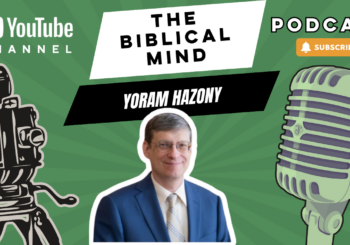The Redemption of Naomi in the Book of Ruth
Leon Kass and Hannah Mandelbaum
Reading Ruth: Birth, Redemption, and the Way of Israel
Paul Dry Books, 2021.
The making of a cynic is simple. You must first begin with a true believer. Next, you permit the passing of time. Little, if anything, more is needed. Few are the objects worthy of the lofty trust that a true believer places in them. The virtually inevitable result of ardent belief in a flimsy object is disappointment, which chastens the believer until she learns not to dispense her trust as easily as she once did. If the disappointment is sufficiently thorough, it may even introduce to the chastened one a whole new identity: “Call me not Naomi, call me Mara, for Shaddai has dealt great bitterness to me. I went out full, and empty did the Lord bring me back.” The book of Ruth begins with Naomi, a true believer, on her way to becoming a cynic, because she professes to have been disappointed by none other than the God of her fathers.
Enjoying this article? Read more from The Biblical Mind.
Reading Ruth: Birth, Redemption, and the Way of Israel likewise has its origin in disappointment. Its co-authors, Leon Kass and Hannah Mandelbaum, a duo of grandfather and granddaughter, admit that their joint project of reading and commenting upon the book of Ruth was a kind of therapy for their shared grief after the death in 2015 of Amy Kass, Leon’s wife and Hannah’s grandmother. As the title suggests, the book, along with being something of a philosophical commentary on the book of Ruth, also recounts the shared experience of reading Ruth in the wake of the same kinds of loss that constitute its drama. They say that the book is “an interpretation of the book of Ruth” as well as an attempt “to recreate the experience of reading Ruth” (ix). Though they insist that they have “not consciously adopted any ‘method’ worthy of the name” (xiii), the hermeneutic (or method of interpretation) is similar to that of Kass’s previous philosophical commentaries on the Bible: The Beginning of Wisdom: Reading Genesis (Chicago, 2006) and Founding God’s Nation: Reading Exodus (Yale, 2021).
It is not at all surprising that the elderly and pious Naomi, with most of her life behind her, should be for Kass and Mandelbaum something of a proxy for grieving a beloved wife and grandmother.
This method of interpretation will likely be unsatisfying to specialists interested in the historical dating of the book, its composition, or its political and social aims. For Kass and Mandelbaum, historical considerations are only ever an object of concern as a means of gaining trans-temporal wisdom from the book itself: “Our chief goal has been to make the text come alive to us—and now, also to you. We have wanted less to learn about it, more to experience and to live with it” (xiv). The demerit of this strategy, when applied both to philosophical and scriptural texts, is the ever-looming threat of anachronism and eisegesis (or reading one’s own ideas into the text). But its great strength is to insist upon, and attempt to demonstrate, the perennial wisdom of the book of Ruth’s teaching. At times Kass and Mandelbaum seem worried that this perennial wisdom will be taken too far, as when they insist that the inclusion of Ruth the Moabitess into the lineage of David ought not to be construed as permission for Jews to intermarry with Gentiles today.
Naomi as the ‘Director of the Drama’ in the Book of Ruth
It is not at all surprising that the elderly and pious Naomi, with most of her life behind her, should be for Kass and Mandelbaum something of a proxy for grieving a beloved wife and grandmother. Their interest in Naomi is an entry point into a book whose genre is unique among the books of the Hebrew Bible. The book of Ruth’s unnamed narrator sets the action during the time of the Judges (1:1), but the concluding genealogy culminates with David, suggesting its narrator knows about the Davidic kingship and therefore writes about these events several generations after they occurred. Though God is mentioned, nowhere in the book does God speak, nor does the narrator ascribe any action to God apart from what is ascribed to him in the speeches of its characters. Ruth’s subject matter reveals it to be the most singularly domestic book in all of the Hebrew Bible. That the actions of this story have geopolitical significance is alluded to only in the very last verse. Of particularly modern interest is the fact that Ruth is the only book of the Hebrew Bible that passes the Bechdel Test.
Ruth is at once an exodus and a nostos, a going out and a coming home. Naomi went out of the land of Israel with her family into the land of Moab to escape a famine. Her journey back to Israel is therefore a homecoming, which brings with it all the questions of classical nostos literature—will she be welcomed into the land that was once her home? Will she have a place in a changed world? The text tells us that they sojourned in the land of Moab for ten years, and much can change in a city in ten years. Friendships and relationships can be built and then fracture over the course of a decade. Loves can come and go. Alliances can be built and shatter. Perhaps Boaz was married when Naomi left for Moab, which might explain why she does not immediately suggest him to Ruth as a kinsman-redeemer until after she had gleaned in his field. Naomi seems initially disoriented in the land that was once her home.
But Ruth’s disorientation is of another variety, since she has never been to Israel. For her, then, her journey is an exodus out of her own homeland and into an unknown land of promise. Nor is it immediately obvious that all would go well with this mismatched pair when they finally arrive at the end of their sojourn. The unnamed women of Israel have no questions for or about Ruth; they are interested only in Naomi, and meet her with incredulity: “Is this Naomi?” These women see in Naomi something of the same change which she herself recognized and named as a new and nascent bitterness that has taken root in her soul. “Empty did the Lord bring me back” (1:23), she replies, ignoring as they did the woman, Ruth, whom she has brought back with her. Ruth’s noble friendship is undoubtedly admirable, but at this juncture of the story, perhaps a bit foolish, and a liability even for Naomi.
Yet all of this begins to change once Naomi has returned to her home and begins to direct all of the action of the book. By the end of the first chapter, Naomi is, in Kass’s and Mandelbaum’s words, “the director of the drama” (60). An armchair grand strategist, Naomi never leaves her home after Chapter 1. Meanwhile Ruth sets out to glean in fields of Boaz, whose attention she draws, and from whom she receives the instruction: “Do not glean in another field, and also do not pass on from here, and so shall you cling to my young women” (2:8). Ruth is given the privileged place among the servant girls of Boaz. Yet when she returns to Naomi at the end of that day, and Naomi inquires from whose field she has reaped such a harvest, Ruth answers truthfully, but then adds her own interpretation of events: “Moreover, he said to me, ‘to the lads who are mine shall you cling until they finish all the harvest that is mine’” (2:21, emphasis added).
But of course the narrator has relayed to us no such instruction from Boaz. Ruth, herself something of a strategist as well, inserts this sentence into her recounting to Naomi, perhaps to suggest that marriage is on her mind, and that she might find a suitable second husband among Boaz’s day laborers. Nowhere is Naomi’s strategic genius more evident and more essential to the successful conclusion of the book than at this key and quotidian moment when she rejects Ruth’s strategy: “It is good, my daughter, that you shall go out with his young women, and that they not trouble you in another field” (2:22, emphasis added). Ruth gets the hint that Naomi has shot down her romantic plans, and heeds the instruction: “And she clung to Boaz’s young women to glean till the barley harvest and the wheat harvest were finished” (2:23, emphasis added).
Ruth’s subject matter reveals it to be the most singularly domestic book in all of the Hebrew Bible. That the actions of this story have geopolitical significance is alluded to only in the very last verse.
On first glance this exchange seems fleeting and insignificant; Ruth is revealing to Naomi the source of her great and fortunate harvest, and Naomi is commending her for her diligence. But when at the end of the book, Boaz accepts Ruth’s request for protection and for marriage, one of the reasons he gives for his favor toward her is that she has “done better in your latest kindness than in the first, not going after the young men, whether poor or rich” (3:10). The narrator breezes over this easy comment, but Kass and Mandelbaum, by focusing on Naomi as the strategist setting the pace and sequence of events, allow their readers to see how awry the whole story might have gone had she been a woman of lesser wisdom. What Boaz is doing here is commending Ruth for not pursuing exactly the marital strategy that she obliquely proposed to Naomi. Had Ruth been left to her own devices, or Naomi less canny, Ruth’s marriage to Boaz might never have turned out as it did. It was Naomi’s stratagems and matchmaking, even while she never leaves the house, that made the redemption possible.
Kass and Mandelbaum have shifted around the cast list of the book of Ruth. Ruth, apparently the protagonist, is now the heroine of the story only insofar as she is wise enough to submit her judgment to the true heroine and mastermind of the narrative, Naomi. At the crucial moment when Ruth must make an appeal to Boaz for marriage, Ruth submits her judgment to Naomi and follows her plan to the letter: “Whatever you say to me, I will do it” (3:5). This obedience to Naomi finds its echo in the obedience of Boaz, who says in reply to Ruth: “Whatever you say I will do” (3:11). Naomi guides Ruth, and Ruth guides Boaz. All the characters of Ruth revolve around Naomi, who governs and directs the story neither through the force of her personality nor through the dominance of her presence, but through the wisdom of her counsel.
Throughout her interaction with him, Boaz is constantly impressed not primarily by Ruth’s own virtues, but by how those virtues have been expressed in her relationship to Naomi, which relationship also functions as the mechanism that secures her own marriage—since she would have no claim on Boaz had she not previously married into Naomi’s family. Boaz ascribes to Ruth chesed (commonly translated into English “lovingkindness”), that virtue which is elsewhere in Ruth ascribed only to God and to no other person, to praise the self-effacing and enduring care that Ruth has demonstrated toward Naomi. When Ruth departs from Boaz after their evening encounter, Boaz weighs her down with barley, so that “you should not come empty-handed to your mother-in-law” (3:17). Boaz is constantly thinking not only of the redemption of Ruth, but also of the redemption also of Naomi.
It is Naomi’s action and life upon which the book of Ruth opens and closes. She has the first speeches of the book, and Ruth is only introduced in her relation to Naomi. Likewise at the end of the book, immediately after the birth of their son, Ruth disappears from the closing scene of the book, not to act, speak, or be mentioned again. The women of Israel, who function in the book like a Greek chorus, bless God because “a son is born to Naomi” (4:17), on whose lap—not the lap of his biological mother—the child was placed.
And so the book of Ruth closes on an elderly and pious woman free to depart in peace, knowing that her grandson will pass on the family line. Early in the book, Naomi ascribes bitterness to herself: “Call me Mara,” she says, which means “bitter.” But in the very next sentence after her speech, the narrator recounts the next sequence of action: “And Naomi came back . . .” Naomi, that is, and not Mara. The omniscient narrator, recounting the story well after Naomi’s death, knows that life to be one that includes a stratum of bitterness, but whose ending was Naomi, sweet.
Image created by Rubner Durais
Subscribe now to receive periodic updates from the CHT.





